‘Most people don’t know we exist’: KC area shop is one of last of its kind in America
Uniquely KC is a Star series exploring what makes Kansas City special. From our award-winning barbecue to rich Midwestern history, we’re exploring why KC is the “Paris of the Plains.”
Over by the hallway to the restrooms at the Blarney Stone is a small glass cabinet that looks at first glance like a display case for exotic insects and butterflies. What it actually contains is a mix of shafts and flights for steel-tip darts — a popular pastime at the midtown dive bar.
It’s convenient to have spare parts on hand. Darts are sharp but fragile. They sail through the air, bounce off the board, snap on the hard floor. In the 1980s heyday of American darts, back when the Kansas City Dart Association boasted more than a thousand players in different divisions and skill levels, these cabinets were as familiar a sight in local taverns as cigarette machines.
“That’s pretty much how we got our start — servicing bars in the area,” said Melody Foster, owner of Horizon Darts. “We had the parts, and we’d send guys out to the bars to take the money and restock the cabinets. And the orders just got bigger and bigger.”
That side of Horizon’s business all but dried up long ago. Electronic dart machines displaced the steel-tip boards, and Amazon obviated the company’s niche middleman status. League numbers dwindled.
But Horizon, over on the edge of the Turner neighborhood of Kansas City, Kansas, is still in the game. Quietly, it is one of the last companies that still manufactures American-made darts.
“Most people don’t even know we exist,” Foster said. “Then other people in the darts world think we’re some huge operation.”
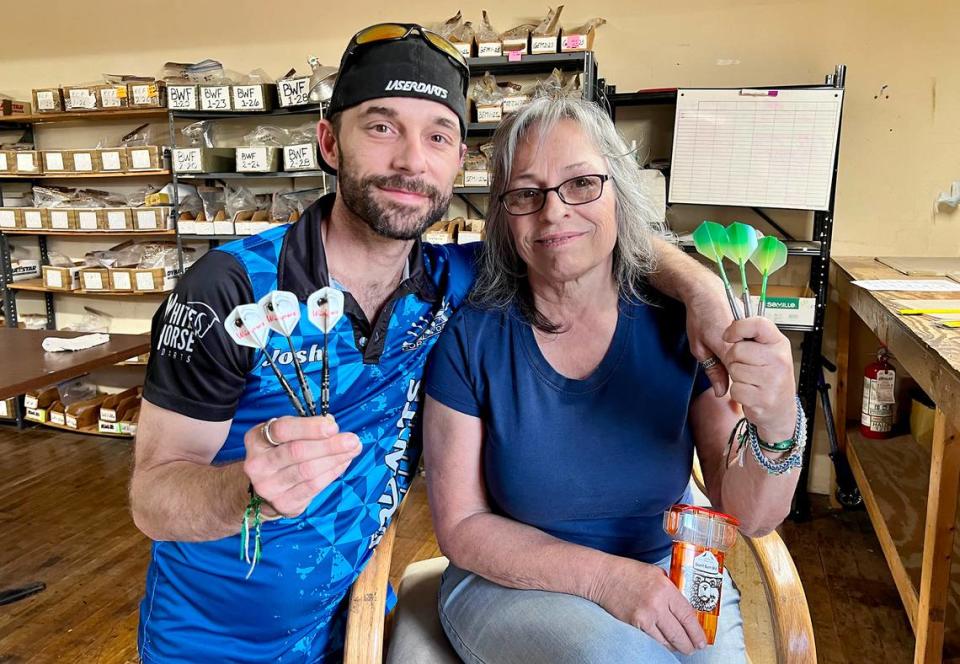
A family operation
In fact, Horizon Darts is a mother-son business these days, run almost entirely by Melody and her son, Josh. It was founded in a Lenexa basement in 1985 by Terry Maness and Dan Troost — Melody’s sister and brother-in-law.
“(Dan) was tired of waiting on dart supplies from England and not getting what he wanted, so he started his own thing selling dart parts here,” Melody said.
A few years later, they bought an Ohio company called Fansteel, which made a popular dart called the Black Widow. The business took off. By the early 1990s, Horizon was a multimillion-dollar business, manufacturing its own darts and retailing and wholesaling products made by others.
Melody joined in 1987. She built darts.
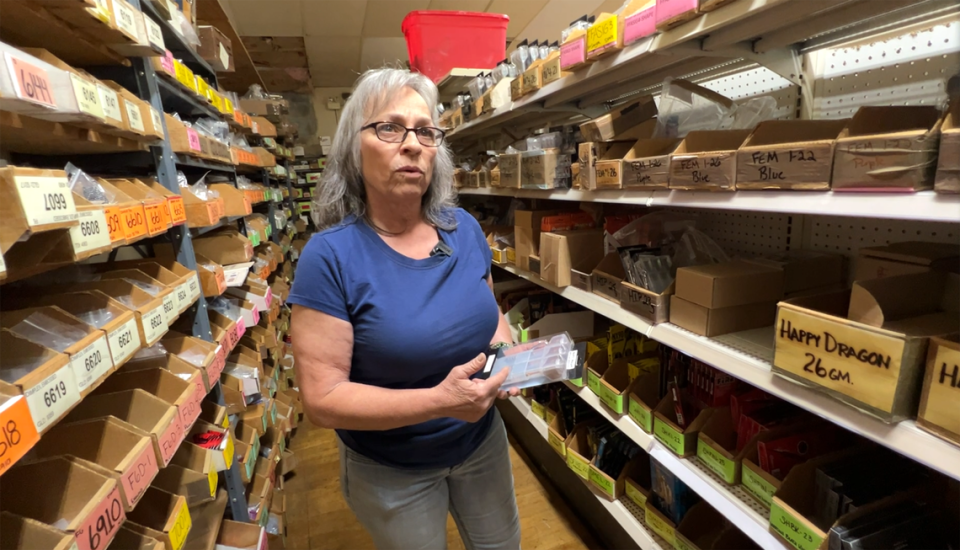
“Same thing we do today,” she said. “Score the point, drill out the barrel, glue the point into the nose of the barrel, then roll it on the table to make sure it doesn’t wobble. If it wobbles it won’t throw right. If it doesn’t wobble, you tap in the point with a mallet, roll it again, then set it up to dry.”
In 1989, the business moved to a much larger space at 2415 S. 50th St. (In the late ‘70s and early ‘80s, the building had been home to One Block West, a music venue that hosted shows by Lou Reed, Talking Heads and the Ramones.) They’ve been there for 35 years now.
The rise of electronic boards in the 1990s signaled the end of the steel-tip darts era — at least in most bars. The machines offered some new bells and whistles (automatic scorekeeping, sound effects, flashing lights) but the main appeal was that the darts had plastic tips. An errant throw at an electronic machine wouldn’t poke a customer’s eye out; an angry patron couldn’t use a plastic-tip dart as a weapon.
Steel tips came to be seen as a liability by bar owners. The purists resisted, but the masses adapted. Steel-tip boards slowly disappeared from the bars. Melody still chafes about it.
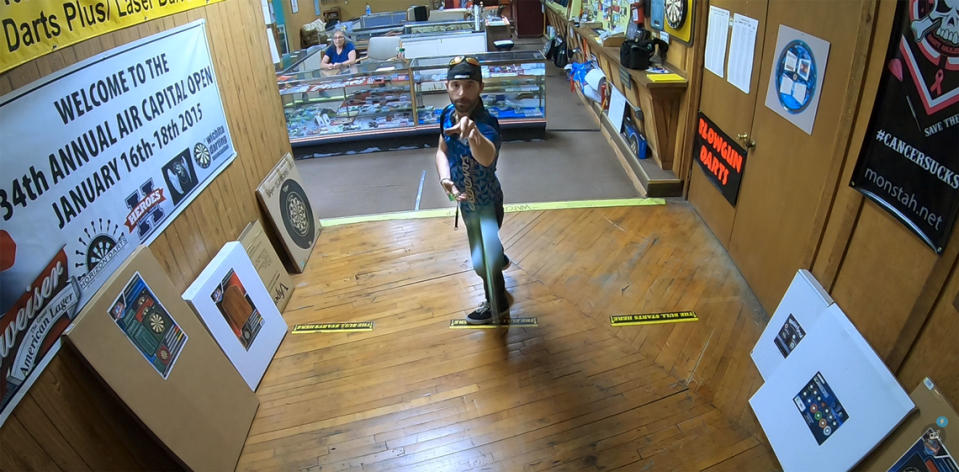
“It was a big scare tactic by the machine operators,” she said. “They’d tell the bar owners their insurance would go up because steel tips are so dangerous. It was all a vicious lie. The insurance was no more than if you had a pool table, where people can crack pool cues over somebody’s head or throw the balls at somebody. But it worked.”
It dented Horizon’s business but didn’t knock it over. The company acclimated and began selling more plastic-tip darts and supplies. The emerging digital age — which ushered in easier access to cheaper products and, to a degree, the democratization of the product expertise held by companies like Horizon — dealt a heavier blow.
“All of a sudden, anybody could sell cheap darts and parts online with way lower overhead,” Josh said.
“The internet put a hurtin’ on the mom and pops,” Melody said. “We lost 70% of our business pretty quickly.”
The Black Widow, Horizon’s signature dart, has in many ways kept the company afloat. Its reputation for quality goes back decades. In an era when a solid set of tungsten darts is readily available on Amazon for $40, many dart players are willing to throw down $150 for a set of Black Widows.
“It’s what we’re known for,” Josh said. “We sell Widows all across the world — 25 countries. It’s a prestige dart. If you add it all up going back 40 years, it’s one of the bestselling darts in the world.”
What’s so special about it? “The balance,” Melody said. “The balance and the design. People like the knurling on the grip, the roughness of the crosshatch etching on the barrel. Everybody has tried to knock it off, but nobody’s ever been quite able to figure it out.”
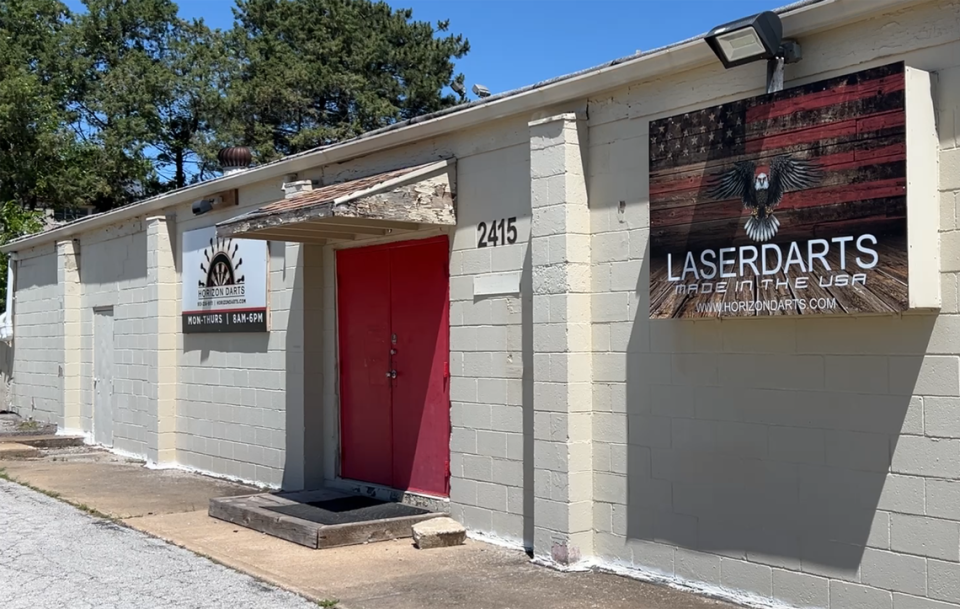
American made
The Widows are also, as the Fosters proudly tout, American made and 90% tungsten.
Tungsten is synonymous with quality in the world of darts. Cheaper dart barrels are often made of brass. Tungsten is more durable and denser. The more tungsten in a dart barrel, the smaller it can be made without sacrificing weight.
“You want something heavy that carries through the air but doesn’t take up a lot of space on the board — so you can fit three of them in a bull’s-eye or in the triple 20,” Josh said. “The problem is, tungsten needs to be mixed with other alloys to keep it hard. And that process is really rough on tools and machines.”
When steel-tip darts fell out of favor in the 1990s, American machine shops gradually stopped producing the tungsten barrels Horizon and other manufacturers used for their darts. It wasn’t worth the wear and tear. Most dart manufacturers worked with Chinese machinists to do the job. Horizon found one in Kenya. But the quality and attention to detail suffered.
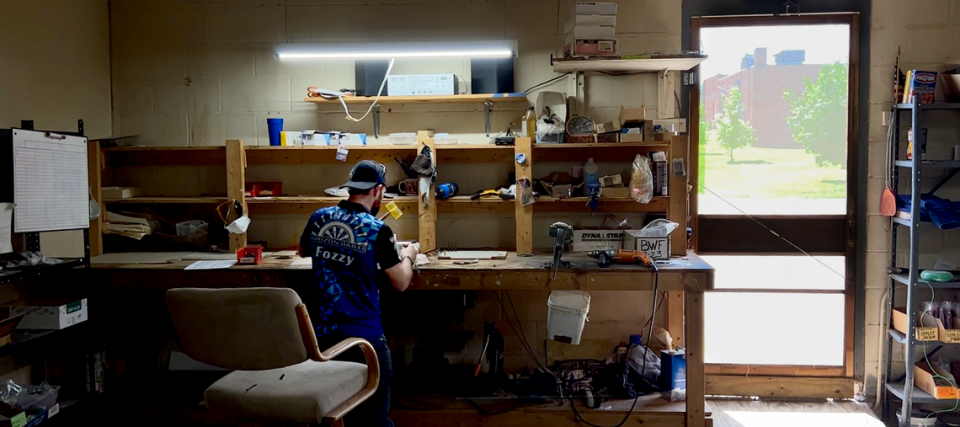
Horizon’s darts were foreign-made until the late 2000s, when the company worked out a deal with an American machine shop to produce tungsten barrels. The arrangement is so rare, the Fosters said, that they didn’t want to even name the city where the machinist is located.
“We have some competitors who would like to know who we use,” Melody said.
Building their darts out of American-made parts — Horizon’s steel points come from New Hampshire — was a boon during the pandemic.
“We flourished during COVID because so much of what goes into our darts is made in the States,” Josh said. “It was almost impossible to get stuff internationally for a long while, and that sunk several (dart) companies. Our worst-case scenario was that we’d have to sell our darts in a bag instead of a case, because all the cases are made in China.”
Bottelsen Darts, the California-based maker of the famed G.T. Hammer Head dart, filed for bankruptcy last year. “They were the biggest, and COVID wiped them out,” Josh said.
Now there’s only a few left: A-Z Darts, Great Lakes Darts, Voks.
“It’s just really tough competing with China’s prices and the big European companies,” said Robert Luce, who owns Voks Darts, based in Melbourne, Florida. “And supply costs since COVID have been outrageous. But Josh and Melody, they’re one of the last companies I’m aware of with a line of darts made in America besides us. And they’re a small family business just like we are.”
“You hear rumors occasionally about more (dart) production coming over (to the U.S.),” Josh said. “It would be great — it’d be easier to get darts made. But it’s been slow to come about.”
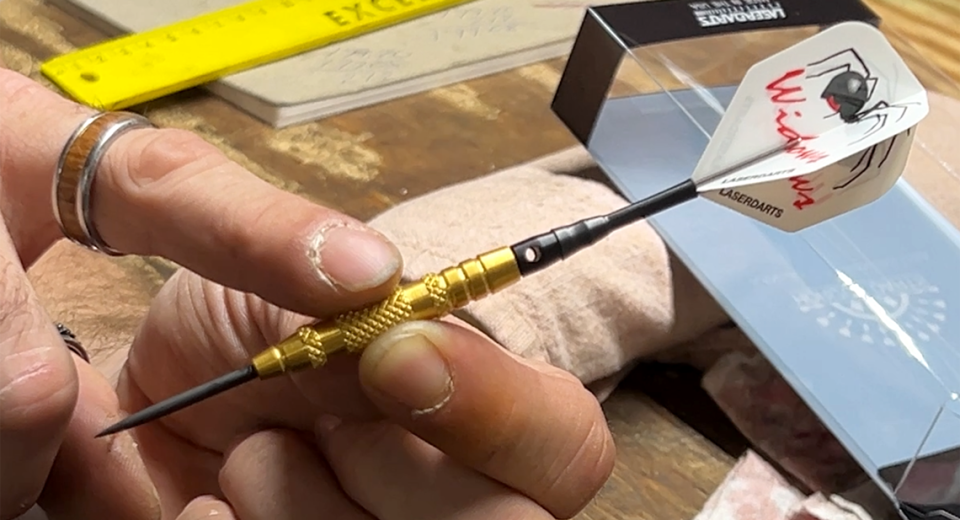
Until then, Horizon is cranking out about 1,000 sets of American-made darts every month, in addition to selling products from other dart companies. They’re available at horizondarts.com and at the store — retail hours are Monday to Thursday, 8 a.m. to 6 p.m. — where customers can try out the darts before they buy them.
Or stop by the Blarney Stone on a Thursday night, when the Midtown Dart League convenes. You’ll likely see some Black Widows flying. And the cabinet’s still stocked by Horizon.


